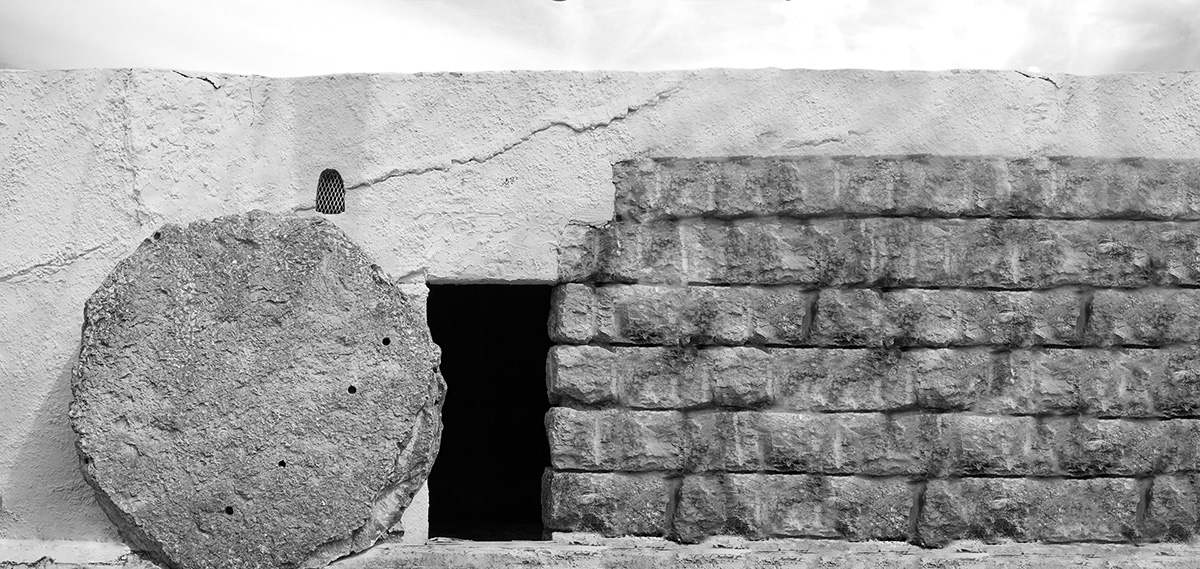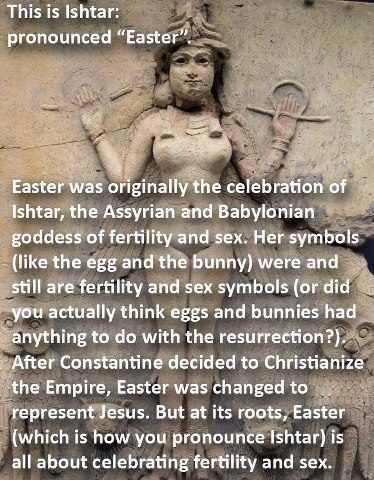
Is Easter a Pagan Holiday?
Brace yourselves, the “Easter is pagan” memes are coming! (One of the more popular examples is shown below.) And it’s not just our atheist friends who do this. Our Jewish and Hebrew Roots friends often join in as well. So let’s take a minute to set the record straight on these claims and examine the origins of Easter.
Man Invented Easter
Jews and Torahists (those groups who believe in Jesus but teach that we should be keeping the Torah) make a pretty big noise about the fact that Easter1 is a man-made holiday. They claim we are still under the Law of Moses and, therefore, at this time of year we should be celebrating Passover, which was given by God, not Easter, which was invented by man. They are right that Easter—while commemorating an act of God in history—is a man-made holiday. It was mandated by the Church, not Scripture. This raises an important question: why is that a problem?
Easter is an annual celebration during which Christians celebrate the resurrection of Jesus and remember what God has done for them. Formally remembering God’s acts among His people is a very biblical thing to do. The Hebrew word for this in Scripture is zakar, which means to remember, recall, or call to mind. This is a practice that saturates the Psalms, is at the heart of the Torah feasts, and is the entire point of celebrating the Last Supper. There is nothing wrong with Christians choosing to celebrate the resurrection of Jesus. The Bible does not mandate Hanukkah or Purim either, but our Jewish and Torahist friends are not wrong to celebrate those man-made feasts.
Easter’s Pagan Roots

The claim that Easter has its roots in the pagan celebration of Ishtar is one of the more popular anti-Easter claims out there. This is surprising because it’s a claim that is based entirely on the similarity between the words Easter and Ishtar and contains two glaring flaws. First, the Christian celebration of the Resurrection of Jesus is not referred to as “Easter” everywhere. In fact, most languages (from Albanian to Italian to Norwegian to Spanish) refer to the celebration using some form of the word Pascha—which comes from the Hebrew word for Passover—rather than the word Easter.
Second, Ishtar was a mythical pagan goddess, not a feast or celebration. She was portrayed as a beautiful and fierce goddess of war and sexual love, the protector of temple prostitutes, and the patroness of the alehouse. Her symbols were not eggs and bunnies, as is commonly asserted, but rather the lion, the storehouse gate, and the eight-pointed star.2 So what does a mythical, warrior-sex goddess have to do with a real, historical Jewish man who laid His life down as a sacrifice for all of humanity and was miraculously resurrected three days later? The answer, of course, is nothing.
Another claim about Easter’s pagan roots is that the English word Easter was derived from Eostre, the Anglo-Saxon goddess of spring and fertility; hence the connection with bunnies and eggs, both of which were seen as symbols of fertility. However, bunnies and eggs have nothing to do with the Christian celebration of Easter. Nowhere in Scripture are eggs or rabbits used as symbols of anything. They are a modern secular tradition, not part of the religious observance of Easter.
So where did the name “Easter” come from? According to Encyclopædia Britannica:
There is now widespread consensus that the word derives from the Christian designation of Easter week as in albis, a Latin phrase that was understood as the plural of alba (“dawn”) and became eostarum in Old High German, the precursor of the modern German and English term. The Latin and Greek Pascha (“Passover”) provides the root for Pâques, the French word for Easter . . . The earliest recorded observance of an Easter celebration comes from the 2nd century, though the commemoration of Jesus’ Resurrection probably occurred earlier.
Encyclopædia Britannica
Where the Two Meet
What muddies the waters for us today is that, sadly, Easter has become secularized. We’ve blended many secular traditional activities with our religious observance of Easter. To that end, we need to concede that some of the modern cultural activities that have become part of Easter—bunnies, colored eggs, baskets of goodies—may well harken back to ancient pagan traditions. This raises an interesting question: Does that make Easter a pagan holiday?
Other ancient pagan activities included singing, praying, and lighting candles. Would we argue that when we do any of those things, we are participating in pagan worship? Of course not. It’s not so much the particular worship activity but rather the object of our worship that matters. The apostle Paul made this point multiple times in the New Testament.
- “So whether you eat or drink or whatever you do, do it all for the glory of God” (1 Cor 10:31).
- “And whatever you do, whether in word or deed, do it all in the name of the Lord Jesus, giving thanks to God the Father through him” (Col 3:17).
When we study these verses in context, we find that Paul’s commands to “do all to the glory of God” directly relate to the issue of celebrating Easter today. In the passages above, Paul is not only referring to cultural idols and the Christian conscience, but he is also teaching how we ought to live our lives in the midst of an unbelieving world. (See John Piper’s insightful teaching for a deeper dive on this topic.) In 1 Corinthians 10, Paul even taught that it was okay for Christians to eat meat that was sacrificed to pagan idols because the “earth is the Lord’s, and everything in it” (1 Cor 10:26, Psalm 24:1). Paul asked, “If I take part in the meal with thankfulness, why am I denounced because of something I thank God for?” (1 Cor 10:30).
This is why I don’t have a big problem with bunnies, colored eggs, or baskets of goodies being part of Easter, as long as they are used in addition to (not as a replacement for!) the celebration of Jesus rising from the dead. As a Church, we must not let culture whitewash the true meaning of Easter. The Resurrection of Jesus is the historical event on which all of Christianity hangs (1 Cor 15:17-19), and is the single most important event in the history of the human race.
Three Reasons Easter is not Pagan
Thus, there are three reasons that Easter is not a pagan holiday:
- Easter is not a holiday that morphed out of an ancient celebration of a fertility goddess or a spring harvest. Rather, it is a religious observance initiated by the Christian Church as a way to commemorate the resurrection of Christ. This makes its historical motivation decidedly anti-pagan.
- Pagan gods and idols are not worshipped during Easter, and Christians don’t celebrate fertility or sex. Instead, we celebrate the resurrection of Jesus. During Easter, Christ’s passion story is read aloud from Scripture, God is glorified by the singing of songs, and the Gospel is preached. This is the antithesis of pagan theology.
- Pagans do not participate in the religious observation of Easter, nor recognize it as a holiday.
So, rest easy, my brothers and sisters. As long as we keep our focus on Jesus, we are free to celebrate Easter with a clear conscience. It is good and right that we thank and praise God for sending us His one and only Son, who, through His death and resurrection, reconciled us to the Father.
The angel said to the women, “Do not be afraid, for I know that you are looking for Jesus, who was crucified. He is not here; he has risen, just as he said. Come and see the place where he lay.
Matt 28:5-6
He is risen, indeed!
1 These same claims and arguments can be applied to Christmas as well. See my previous articles here and here.
2 Editors, “Ishtar,” Encyclopaedia Britannica, www.britannica.com/topic/Ishtar-Mesopotamian-goddess.
